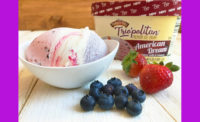Anuga 2019 identifies top themes in international new product development
In term of regions, Europe ranks first in terms of introducing new free-from products, whereas in North America compared to Europe, just under half as many new products of this category are introduced.

Koelnmesse GmbH, the Germany-based host of Anuga 2019, which takes place Oct. 5-9 in Germany, identified top themes in international food and beverage development.
Functional and free-from products
"Free-from" is becoming a more popular category. In 2018, 23% of all new foods carried a "free-from" notice. Gluten-free products stand out within this group. In 2018, 58% of all free-from products were gluten-free products, whereby vegan products with an average annual increase of 30% since 2014 (annual overall growth 2014-2018) recorded excellent growth, according to studies produced by Innova Market Research, The Netherlands.
In term of regions, Europe ranks first in terms of introducing new free-from products, whereas in North America compared to Europe, just under half as many new products of this category are introduced.
Halal food
Halal-certified food that corresponds to the Islamic dietary rules is gaining significance. The increasing demand for halal ready-made products in the Near East, combined with the growing demand in the West, is leading to a strong growth of halal-certified food. The introduction of new halal products lies at a stable average annual growth of 10.7% worldwide. In 2018, 67% of all market introductions of halal products were recorded in Asia, where the majority of the worldwide Muslim population lives, according to Innova Market Research. Africa and the Near East are also important markets for halal products.
Kosher products
The demand for kosher products is increasingly strongly. The distribution of these foodstuffs, which correspond with the Jewish dietary rules, is increasing according to data provided by Innova Market Insights. In 2018, 33% of the kosher products were also gluten-free, 25% were free of genetic modifications and 22% carried a "without additives and preservatives" notice.
Non-GMO products
In 2018, over 5% of the newly introduced products worldwide carried a "non-GMO" notice, which corresponds to an average annual growth of 14% since 2014. Over the past years, North America has taken over from Europe as the leading market region for "non-GMO" notices. Growth has also been recorded in Latin America. Most of the newly introduced non-GMO products fall in bakery products, dairy products and snacks.
Organic products
The percentage of new products that fall under the organic segment grew from 8.8% of the new introductions in 2014 up to 10.5% in 2018. In Europe, with an average annual growth of 15.5%, the share of organic seals among the newly introduced European foodstuffs is even more significant (annual overall growth 2014-2018). In 2018, 58% of all new introductions with an organic seal occurred in Europe, 22% were introduced in North America. The fastest growing category is "snacks" with an average annual growth of 18.6% (annual overall growth 2014-2018).
Products with protected designation of origin
The interest in and awareness around the origin of foodstuffs is being expressed by the fact that consumers want to know how their food is produced, where exactly it comes from and which quality the ingredients have. Locally and regionally produced foods appear to be more trustworthy to the consumers. Furthermore, certificates of origin like the protected designation of origin or protected
geographical indication enhance the image of traditionally manufactured products and underline their origin and quality. Indeed, 10% of the consumers want their fruit and vegetables, meat, fish and eggs to be of local origin or locally produced, as outlined by a survey conducted by Innova Market Insights.
Ready-to-eat products
Traditional meal times and situations are becoming less and less common, and the consumers are looking for fast, convenient and yet nevertheless healthy solutions that suit their busy lifestyles better. Consumers are increasingly looking for healthy, to-go snacks in practical packing. For snacks, the priority lies on the sense of taste and authentic aromas, whilst the demand for global aromas is increasing fast.
In 2018, one of four ready-made meals and to-go products were gluten-free, which corresponds to an average annual growth of 37.2% (annual overall growth 2014-2018). Further important notices are high protein content/source of protein, as well as high fiber content/source of fiber, ecological and natural.
Superfoods
Foodstuffs that are of especially favorable nutritional value can be classified as superfoods. These are nutritious foodstuffs that have a special added value for the health and well-being. The number of newly introduced foodstuffs marketed as superfoods recorded an average annual growth of 12% (annual overall growth 2014-2018). The overall penetration of this category lies in the section grains and primeval grains and the fastest growing superfoods are pumpkin seeds (+34%), sunflower seeds (+21%), quinoa (+14%), and linseed (+14%) (annual overall growth 2014-2018).
Products based on fair trade
Fair-trade focuses on the international development, social equity and fair economic profits. Although it is still a niche market, less than 1% of all newly introduced foodstuffs displayed a "fair-trade" notice, these recorded a stable average annual growth of 6% (annual overall growth 2014-2018).
Looking for a reprint of this article?
From high-res PDFs to custom plaques, order your copy today!






